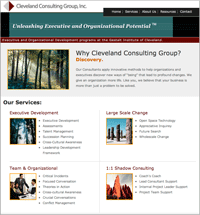 |
|||||||||||||||||||||||||||||||||||||||||
In This Issue Quick Links Don't miss another Issue! |
MAY 2009
Some of you may recall that I have been advocating that when the economy goes into a downward spiral, it is a prime time to reinvent your practice and yourself. Subsequently, I have been updating my professional knowledge by attending a series of training programs to "round out my flat sides" and become certified with instruments that can assist in my executive and organization development practice. I hope each of you have been doing the same. Simultaneously, I have used the last six months to evaluate my consulting practice. I have condensed it into two For a "look-see" concerning all of these changes, go to my new website at www.clevelandconsultinggroup.com. In addition, I find that subsequent to these focused efforts, I have a clearer and more compelling picture of what I do. My nuts and bolts, elevator speech, or whatever we call it these days, is clearer and much more applicable to potential clients. It reminds me of an old professional practice saying that "we are what we focus on". As a result, as a practitioner, I am more congruent with my practice. In the remainder of the newsletter, I've included some recent information on career derailers. Whether we are coaches or consultants, we all have seen people being blind to their fatal flaws. I hope you enjoy the newsletter. Respectfully, Herb StevensonPresident/CEO PS: While writing this newsletter, I was reminded that as OD consultants one thing that often gets lost in the hustle and bustle is our health. My genetic predisposition for blood clots became figural after a period of extensive flying, in particular, a two day round trip to London. As a group, we seem to be so focused on others and on our work, that our self care moves to the background till we exhaust all of our resources. Ponder for a moment: what could you do in five minutes per day to increase the quality of your health. Now DO IT! Career DerailersIn 1989, Michael M. Lombardo & Robert W. Eichinger introduced, Preventing Derailment: What to Do Before it’s too late, through the Center for Creative Leadership. In that seminal work, they noted that there are specific behaviors that tend to lead to career derailment. See figure 1, below. Often, the behaviors are completely outside of the awareness of the individual, or, if not out of their awareness, outside of their capacity to understand. For example, one client had received multiple feedback and performance reports indicating that his leadership was heavy-handed. He proudfully noted that he had heard it many times. This time it was clearly explained that he would not be promoted to the Presidency and that unless his social and relational skills dramatically improved, he would be terminated. Smile erased and shock set in. He never made it. Figure 1: Leadership Derailers
Jack Zenger and Joseph Folkman, recently highlighted in the June Harvard Business Review, the Ten Fatal Flaws That Derail Leaders from their study of 450 Fortune 500 executives and a second study they completed of the least effective 1100 executives from a pool of 11000, executive 360 reports. They noted that the ineffective leaders were often unaware that they exhibited these behaviors. In addition, their self image often was inflated in comparison to the feedback. Figure 2: The Worst Leaders Heading for a Fall
I use these charts often when working with executives. Typically, I will review them as a form of self assessment and then again after 360 feedback reports. By doing so, I am able to get the attention quicker and support movement towards change. ____________________ Michael M. Lombardo & Robert W. Eichinger. (1989) Preventing Derailment: What to Do Before it’s too late. Greensboro, North Carolina: Center for Creative Leadership. (7-9) Upcoming Programs & WorkshopsBEI Introductory WorkshopJuly 20-21, 2009 Completing an Introductory workshop is a prerequisite for attending the Gestalt Institute of Cleveland Executive & Organization Development Program, Becoming An Effective Organizational Intervener (BEI). This three-day workshop provides an opportunity to experience the "gestalt" approach through learning basic concepts and applying them through structured exercises. Unique to our approach is that each workshop is a balance of direct teaching and immediate application. Learn more... Becoming An Effective Intervener (BEI) ProgramNovember 15-21, 2009 (first week) Becoming an Effective Organizational Intervener is a dynamic program for people involved in leadership within organizations whether it be via day-to-day management or organizational change and development. In five exciting sessions, participants will explore our overall model and theory base as applied to individual, group, and organizational levels of system. The program offers participants a powerful and integrative opportunity to increase their awareness, knowledge, and skills in order to become more effective interveners in organizations. Learn more... Conflict, Confrontation & Negotiation (CCN) Workshop SeriesThe premise of this 3 workshop series, Conflict, Confrontation & Negotiation, is that individuals become more effective leaders when they have better understanding of the dynamics of conflict, knowledge about how to manage confrontation and the skills to negotiate reconciliation, resolution, and/or settlement. Learn more...
Read more articles and see current workshops and retreats on the Cleveland Consulting Group website |
||||||||||||||||||||||||||||||||||||||||

